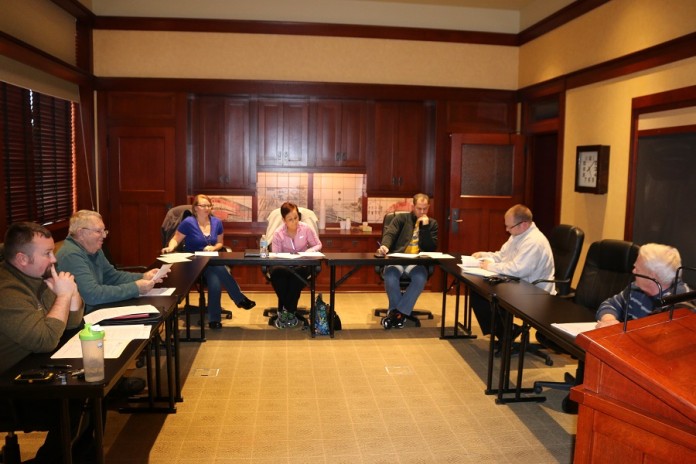
In a curious example of symmetry in city affairs, a Perry City Council member who helped draft the new rental code became the first to appeal it Thursday at the first official meeting of the Rental Code Board of Appeals.
In its first order of business, the board chose Eric Vaughn to chair its meetings and April Tierney as vice-chair. Other board members attending Thursday were Ronald Thielen and Lori Meinecke. Perry Building Official Steve Tibbles and Perry City Clerk Corey Eastman were also present. Board member Bob Nevitt was absent.
At-large Perry City Council member John Andorf then came before the newly constituted Rental Code Board of Appeals and claimed a property he owns at 415 Willis Ave. is not a rental unit as defined in the rental ordinance and should be exempt from the requirement for registration and inspection.
Chapter 156.03 of the Perry Code of Ordinances defines terms used in the rental code. One of the code’s key terms, “rental unit,” is defined as “any building or portion thereof that contains living facilities, including provisions for sleeping, eating, cooking, and sanitation as required by this code and rented for monetary compensation.”
Andorf said he receives no “monetary compensation” for the property. He said a member of his family lives rent-free in the Willis Avenue house, so it should not be subject to registration and inspection because it is not a rental unit.
The board was concerned about the unclear meaning of “rental unit.”
“I think the ordinance as it’s written is what we have,” Vaughn said, “and that’s what we need to follow, but I think it’s a bad definition that needs to be re-wordsmithed.”
Board member Thielen said granting one appeal could bring forth others.
“How many more of these are we going to have if we open this up?” Thielen said. He voted against granting Andorf’s exemption, but the other three members voted in favor, and the exemption was granted.
“I think we need to enforce the code as written,” Andorf said after the board’s decision, “or else we’re on dangerous ground.”
A similar appeal was filed by Tony Sanchez on property he owns at 819 Rawson St. The board tabled Sanchez’ appeal, postponing action until it receives more information about the property. Sanchez did not attend the meeting.
Following these first two challenges to the new rental ordinance, the board discussed the looseness and obscurity in this portion of the code and voted to recommend to the Perry City Council’s Public Safety Committee a review and possible revision of the language in the ordinance’s definition of “rental unit.”
The Public Safety Committee is composed of Council members Barb Wolling and Dr. Randy McCaulley and City Administrator Sven Peterson.
“The bottom line is safety,” Meinecke said.
The board also discussed possible ways to tighten the language of the code, including omitting the condition that property be “rented for monetary compensation” and replacing it with the stipulation that any residential property not occupied by its owner will be treated as a rental property.
“I think owner-occupied would just settle this,” Meinecke said. “If it’s not owner-occupied, then it’s a rental. That’s the easiest way to put it.”
According to estimates, about one-third of Perry’s 3,000 residential dwellings are rental properties. About 900 rental units were registered by their owners by the Dec. 31 deadline, but about 375 remain unregistered, according to Tibbles. Some of the unregistered properties might be vacant lots or houses purchased under contract, he said.
In order to try to sort out the true rental properties from others, the city sent out letters to the owners of the 375 unregistered rental properties Friday, informing them of the March 31 deadline for registering their properties. Owners face a $100 late fee on top of the $25 annual registration fee.
Properties remaining unregistered on April 1 will be treated as rental properties and assessed fees on that basis, according to the city’s letter. Landlords can register their property online at the city of Perry’s website.


















I think that Ms. Meinecke has the correct terminology: “I think owner-occupied would just settle this,” Meinecke said. “If it’s not owner-occupied, then it’s a rental. That’s the easiest way to put it.” Other non-owner occupied homes have been registered. What makes a city councilman, who helped draft the law, think he should be exempt? Did he deliberately “mislead” the council to be able to circumvent the code?
It amazes me you have to create a government agency to get rental units under control. I hope they can turn it around. Way too many low-income homes in town, and that hurts new people moving to town. It’s a vicious cycle, and I wish the panel the best of luck in what it’s trying to do.